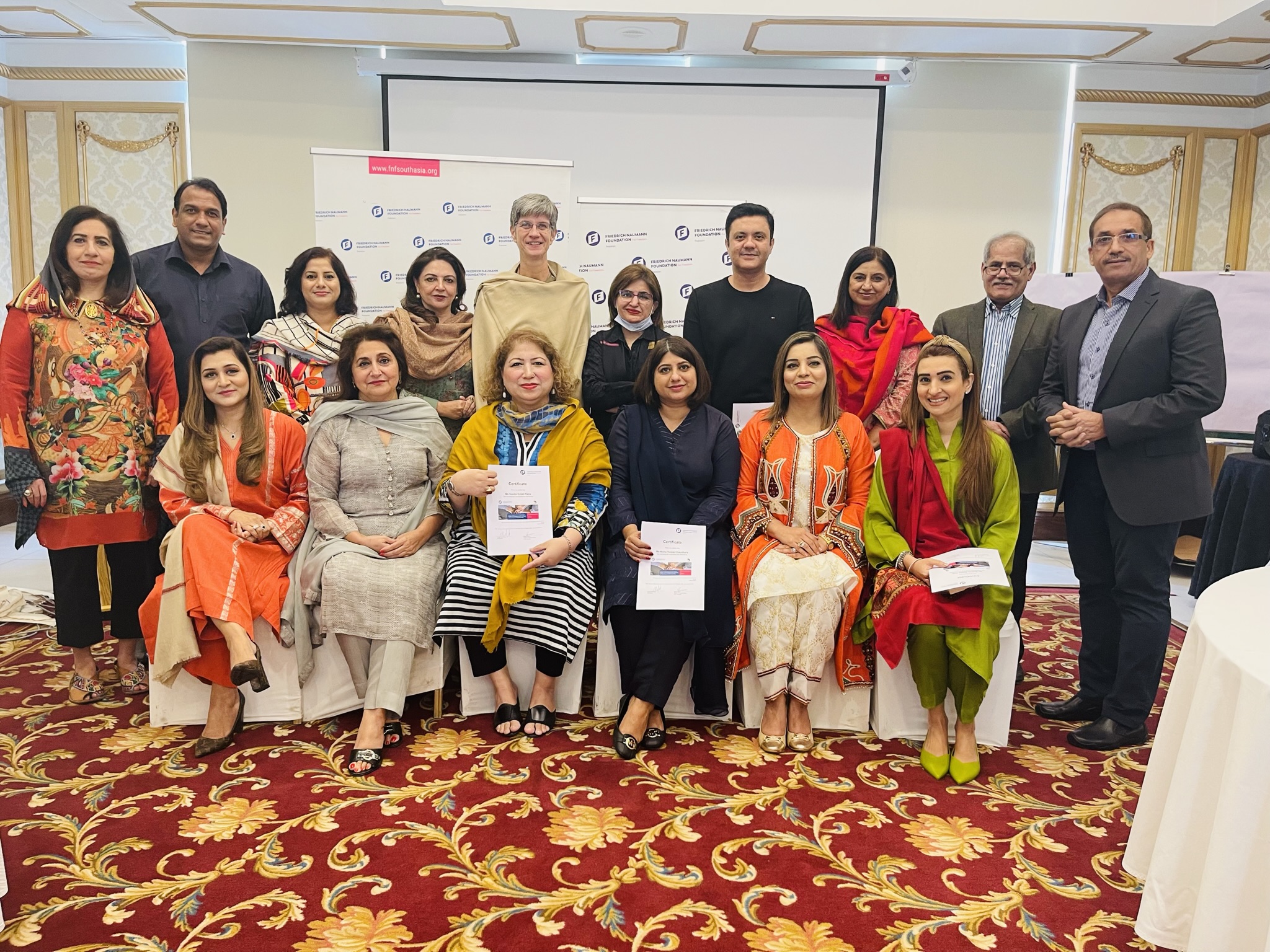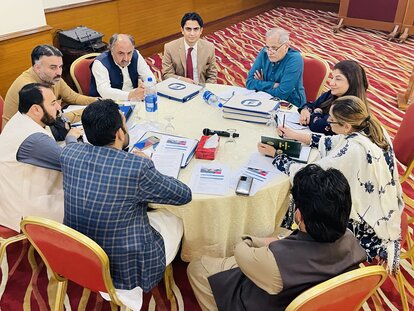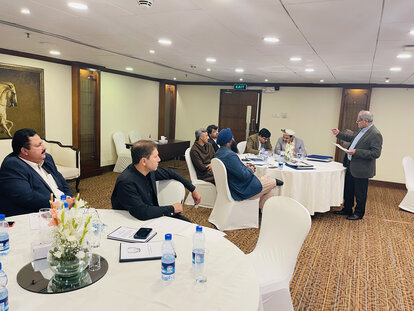Pakistan
Even MPs need training on Parliament Rules of Procedures!

Young Parliamentarian Education Program for first time MPAs from Punjab Assembly, Murree, Oct 2021
© Friedrich Naumann Foundation for Freedom PakistanEvery election brings many first-time mandate bearers to the representative democratic institutions in Pakistan. When they enter the precinct of parliamentary/legislative institutions, though they are endowed with an outstanding educational capital, talent, skills, and enriching political experiences, work on the House floor and in the committees is altogether a very different challenge. It takes time to understand the institutional sociology and working of the parliamentary institutions and learn the rules of procedure. Most of the time, for the majority of the first-time legislators, learning is proverbial 'learning by doing.'
A dedicated Pakistan Institute for Parliamentary Services was established through an Act of the Parliament in 2008, but its provincial-level infrastructure and services are rudimentary. Therefore, there is a vast 'learning opportunity gap' for many member of parliaments (MPs) that is usually filled by development partners and friends of democracy in Pakistan like the Friedrich Naumann Foundation for Freedom Pakistan and many more.
The overall parliamentary community at federal and provincial levels in Pakistan is comprised of 1191 mandate bearers. Out of these, 749 are members of the four provincial assemblies (aka Member Provincial Assembly / MPA). While Pakistan is a country that is experiencing a youth bulge, many of the first-time legislators are also young parliamentarians. The Inter-Parliamentary Union considers mandate bearers under 45 as young. In Pakistan, one is eligible to contest at the age of 25 for the provincial and national assembly and at 35 for the Senate of Pakistan.
In this context, Friedrich Naumann Foundation for Freedom Pakistan designed and delivered the 'Young Parliamentarians Educational Program.' The program offered learning opportunities during the first year and produced valuable knowledge products about fundamental human rights. In the second year (2021), the program was tailor-made to learn about the Rules of Procedures and techniques to apply available parliamentary tools to generate legislative business on issues close to the heart of MPAs and are of significant importance to the citizens. I was lucky to design and facilitate three workshops during the second year in Bhurban for members of the Provincial Assembly of Punjab, in Karachi for members of the Provincial Assembly of Sindh, and in Islamabad for members of the Provincial Assembly of Khyber Pakhtunkhwa. Unfortunately, the provincial Assembly of Balochistan was experiencing a vote of no confidence against the then chief minister-therefore learning opportunity for them is still a pending agenda.
Most of the time, for the majority of the first-time legislators, learning is proverbial 'learning by doing.'
In all the three 'two-day interactive workshops,' young parliamentarians hailing from the provincial assemblies of Punjab, Sindh, and Khyber Pakhtunkhwa enthusiastically participated and exhibited unique interest and creativity. Participation of the first-ever elected members from erstwhile Federally Administered Tribal Areas (FATA) was historical in the workshop dedicated to the Provincial Assembly of Khyber Pakhtunkhwa. At the end of these workshops, almost every participant had several draft questions (for Question Hour), resolutions, Call Attentions, and other parliamentary products to push them to be on the 'Order of the Day' in their respective assemblies. It is worth mentioning that every member submits several questions, resolutions, Calls attention, private legislative proposals, etc.-but it requires a lottery luck to be on the House Agenda and get an opportunity to speak on the floor.
However, the Standing Committees that serve as mini-legislature and brain of the House offer much greater space. Therefore, the participants were encouraged to shortlist the issues they are passionate about or are of concern to their constituency and then employ all available parliamentary tools to highlight them. The participants were also provided an opportunity for a quick and coordinated reading of the Constitution of Pakistan, the Rules of Procedure of the Assemblies, and the Rules of Business of the respective provincial governments. Many participants acknowledged that they were doing this for the first time.

MPAs from Sindh Assembly engaged in group discussion during YPE Program, Nov 2021
© Muhammad Anwar / Friedrich Naumann Foundation for Freedom PakistanDuring the workshops for the Punjab and Sindh Assembly, Ms. Birgit Lamm, Country Head of FNF Pakistan, apprised the participants about the work of the Foundation and the rationale of the Young Parliamentarian Educational Program. She also provided tips for the way forward. For the workshop for members of Khyber Pakhtunkhwa Assembly, Muhammad Anwar, Head of Administration and Program, introduced the Foundation and apprised about the program's rationale. There was a dedicated session to explore the history, heritage, and hope about the assembly in all workshops. In Punjab, former legislator Mian Imran Masood, Sindh renowned intellectual Jami Chandio, and Khyber Pakhtunkhwa senior journalist Hassan Khan shared their views.
I have always maintained and advocated that Pakistan is a unique democratic-parliamentary product. All significant decisions about independence happened in the aftermath of the 1946 elections. An Act in the House of Commons paved the way for independence; the partition of Punjab and Bengal was voted upon, and decisions to join Pakistan were taken through a parliamentary vote in Sindh, Punjab, and Bengal assemblies, in Khyber Pakhtunkhwa (then NWFP) and Sylhet there were referendums. The Commissionerate province of Balochistan joined via the decision of a Shahi Jirga, and about a dozen princely states joined Pakistan through annexation agreements-all democratic political mechanisms.
Even the transfer of power happened in the Constituent Assembly of Pakistan in Karachi on August 14, 1947. The founder of Pakistan, Quaid-i-Azam Muhammad Ali Jinnah, declared the legislature "sovereign" on August 11, 1947. While celebrating the 75-year of resilient existence of Pakistan-we need to re-emphasise the centrality of parliamentary institutions. To rediscover this spirit and evolving culture of parliamentary democracy in Pakistan, initiatives like the "Young Parliamentarians Educational Program" are essential. There shall be no doubt that the parliamentarians are the brain that will think and decide about our brighter and better future.

The MPAs from Khyber Pakhtunkhwa during the YPE Training ' Rules of Procedures in KP Assembly' , Dec 2021, Islamabad
© Muhammad Anwar / Friedrich Naumann Foundation for Freedom PakistanMr. Zafarullah Khan has served as Executive Director of the Pakistan Institute for Parliamentary Services from 2016-19 and is Convener of Parliamentary Research Group. In 2021 he conducted three Workshops under FNF Pakistan's Young Parliamentarian Education Program - one each for the first time legislatures of Punjab, Khyber Pakhtunkhwa and Sindh Assemblies- on Rules of Procedure and Conduct of Business in the Assembly.
